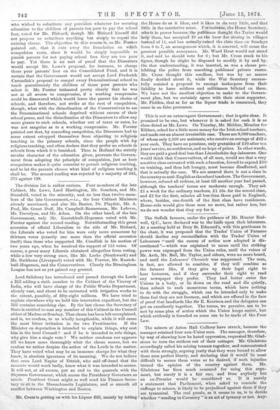Lord Salisbury has introduced and passed through the Lords a
Bill adding a sixth member to the Cabinet of the Viceroy of India, who will have charge of the Public Works Department, already vast, and about to be entrusted with irrigation works to the extent, possibly, of fifty-eight millions. We have tried to explain elsewhere why we hold this innovation expedient, but the Bill contains something eke. By the last clause the Secretary of State is entitled to seat any member of this Cabinet in the Council either of Madras or Bombay. That clause has been left unexplained, and is, we confess, to us wholly inexplicable, while it will cause the most bitter irritation in the two Presidencies. If the Minister on deputation is intended to explain things, why seat him in the local Council ?• and if he is intended to rule things, why give him a single vote ? We neither condemn nor approve till we know more thoroughly what the clause means, but we confess we rather despise the action of the Lords in the matter. They have voted what may be an immense change for what they know, in absolute ignorance of its meaning. We do not believe that even Lord Napier of Ettrick, who said off-hand that the measure would work badly, knew what it was intended to secure. It will not, at all events, put an end to the quarrels with the Supreme Government, which amuse the Presidency Governors so much. President Grant might as well send his Finance Secre- tary to sit in the Massachusetts Legislature, and so smooth all conflict between Washington and Boston.


































 Previous page
Previous page